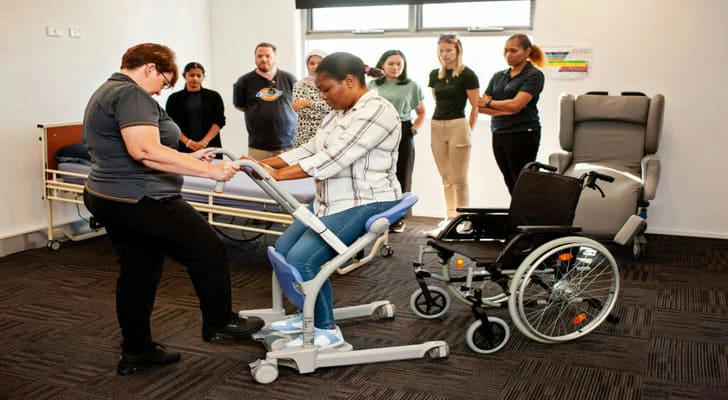Growing Demand For Disability Support Workers In Australia: Is Now The Right Time To Enroll?
If you enjoy working with people and have the empathy to help others adjust to life with a disability, then a job as a disability support worker could be the ideal career for you. According to the Australian Government, demand for people working in the disability support industry will continue to increase until 2025. So, is now the right time to be a disability support worker? Read on.

Understanding Disability Support Worker in Australia
What is a Disability Support Worker?
Disability support workers in Australia help people with disabilities live independently by assisting with daily tasks, social participation, and emotional well-being.
Disability Support Worker Key Duties:
• Personal Care Support: Assist people to complete basic daily tasks such as dressing, bathing, and grooming, and maintain physical and mental health by regularly checking and measuring blood pressure.
• Household Support: Assisting in performing daily home care and routine tasks, such as helping with running errands or shopping.
• Emotional Support: For those who cannot leave their homes, we develop plans based on their needs to improve their quality of life.
What certifications do you need to become a disability support worker?
In Australia, there are no required certifications for disability support workers. You don’t need any educational requirements, and 11% of workers have only completed Year 10 or below of school. However, several certifications are valuable in the field, and attaining a certification will make you more attractive as a candidate for disability support jobs.
Certificate III in Individual Support
This entry-level course is widely recognized and provides the foundational knowledge and skills required for a career in disability support. The curriculum covers topics such as:
• Disability awareness
• Providing person-centered care
• Supporting individuals with complex needs
• First aid and safety protocols
Certificate IV in Disability
For those looking to further their qualifications, this advanced course builds on the Certificate III and prepares you for more specialized roles, including supervising others in disability support settings. It covers areas like:
• Implementing individual service plans
• Working with clients with high care needs
• Managing challenging behaviors

Pathway to becoming a Disability Support Worker
Disability support worker jobs are the perfect launchpad for a new healthcare career. With the experience gained in your initial disability support worker job, or further study undertaken, there are plenty of directions your career path could take. Pathways could be:
1.Australian Red Cross
The Australian Red Cross provides a range of training and courses to develop practical skills for people interested in areas such as health, community services, and emergency management. Such as the Individual Support (Disability) qualification. Course content includes:
• Personal care and Providing psychological support
• Mobility support (natural disasters, mental health issues, etc.)
The Red Cross also offers flexible learning options for those who need to attend from home or work. Combining online learning with live events allows participants to gain practical experience while learning the basics.
2.Government Support Programs
The Australian Government supports people interested in working in disability jobs through JobTrainer, which provides subsidized training to eligible participants. JobTrainer aims to address skills shortages in the disability sector by providing training for individuals looking to enter high-demand fields. To qualify, applicants must meet specific criteria, such as age or employment status.
Key Features of JobTrainer:
• Prioritizes individuals aged 18-35.
• Offers short-term certification courses, such as the CHC33021 Certificate III in Individual Support (Disability).
3.TAFE Program
The TAFE program is funded by the Australian and Victorian Governments and includes over 80 TAFE qualifications and short courses, including CHC43121 – Certificate IV in Disability Support . The Australian Government has also announced that 5,200 new places will be made available to Victorian residents from January 2025, including up to 1,300 apprenticeship places.
4.Alliance Community
Alliance Community is a registered NDIS service provider specializing in support services for older people, mental health clients, youth with disability and older people. The community provides training in PEG, positive behavioral support, and it is paid training.

Benefits of Career in Disability Support Worker
1.Government support and policy guarantees
The Australian government continues to invest resources and funds to promote the social integration of people with disabilities. With the continuous optimization of policies such as NDIS, the government's investment in the disability support industry will promote the long-term development of the industry and provide more career opportunities for practitioners.
2.Improve employment competitiveness
Through this training course, trainees can obtain a disability support worker certificate officially recognized by Australia, which will greatly improve the competitiveness of trainees in the job market.
3.Flexible employment
Disability support work is not limited to traditional full-time jobs. With the popularity of flexible working, many disability support workers are able to choose full-time, part-time or freelance work modes.
What is the job outlook like for disability support workers?
Once you have completed your training, you will easily find work as a disability support worker across the country. 4.4 million people in Australia (18% of the population) have a long-term disability. Of these, 32% (or 1.4 million people) have a severe disability, which means they require ongoing support to live independently.
Although the proportion of the population with a disability has decreased over time, the need for support workers will continue to increase as the population ages.

Elma's Support Worker Development Path
Elma, 28, began her career in disability support with a Personal Support Level 3 certification, providing daily assistance to a client with physical and intellectual disabilities. Through her dedication and attention to detail, she not only enhanced the client's quality of life but also helped them gain greater independence. To further develop her skills, Elma pursued additional studies and earned the Disability Level 4 Certificate. With her advanced expertise, she was promoted to a senior support worker, becoming a key member of the team and assisting even more individuals in need. This advancement marked a significant milestone in her successful career.
Conclusion
Disability support workers are in high demand, and it’s easy to get into the profession, with paid training and certification, no experience required, all you need is empathy! Empowering lives. Become a Disability Support Worker today!
More information: Disability Support Worker Job
